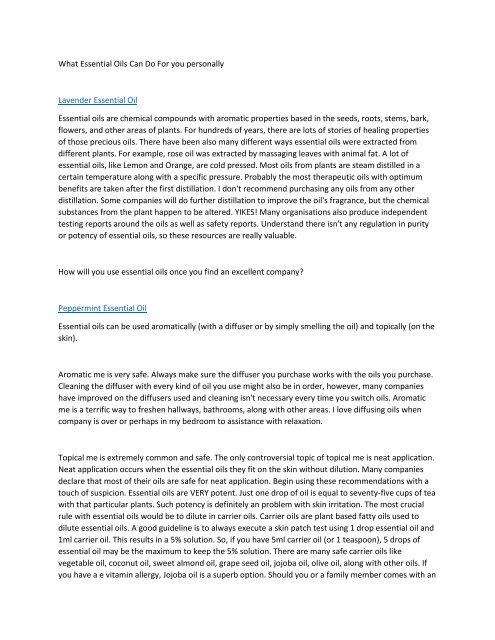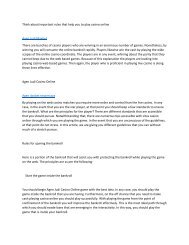What Essential Oils Can Do For you personally6
You also want an ePaper? Increase the reach of your titles
YUMPU automatically turns print PDFs into web optimized ePapers that Google loves.
<strong>What</strong> <strong>Essential</strong> <strong>Oils</strong> <strong>Can</strong> <strong>Do</strong> <strong>For</strong> <strong>you</strong> personally<br />
Lavender <strong>Essential</strong> Oil<br />
<strong>Essential</strong> oils are chemical compounds with aromatic properties based in the seeds, roots, stems, bark,<br />
flowers, and other areas of plants. <strong>For</strong> hundreds of years, there are lots of stories of healing properties<br />
of those precious oils. There have been also many different ways essential oils were extracted from<br />
different plants. <strong>For</strong> example, rose oil was extracted by massaging leaves with animal fat. A lot of<br />
essential oils, like Lemon and Orange, are cold pressed. Most oils from plants are steam distilled in a<br />
certain temperature along with a specific pressure. Probably the most therapeutic oils with optimum<br />
benefits are taken after the first distillation. I don't recommend purchasing any oils from any other<br />
distillation. Some companies will do further distillation to improve the oil's fragrance, but the chemical<br />
substances from the plant happen to be altered. YIKES! Many organisations also produce independent<br />
testing reports around the oils as well as safety reports. Understand there isn't any regulation in purity<br />
or potency of essential oils, so these resources are really valuable.<br />
How will <strong>you</strong> use essential oils once <strong>you</strong> find an excellent company?<br />
Peppermint <strong>Essential</strong> Oil<br />
<strong>Essential</strong> oils can be used aromatically (with a diffuser or by simply smelling the oil) and topically (on the<br />
skin).<br />
Aromatic me is very safe. Always make sure the diffuser <strong>you</strong> purchase works with the oils <strong>you</strong> purchase.<br />
Cleaning the diffuser with every kind of oil <strong>you</strong> use might also be in order, however, many companies<br />
have improved on the diffusers used and cleaning isn't necessary every time <strong>you</strong> switch oils. Aromatic<br />
me is a terrific way to freshen hallways, bathrooms, along with other areas. I love diffusing oils when<br />
company is over or perhaps in my bedroom to assistance with relaxation.<br />
Topical me is extremely common and safe. The only controversial topic of topical me is neat application.<br />
Neat application occurs when the essential oils they fit on the skin without dilution. Many companies<br />
declare that most of their oils are safe for neat application. Begin using these recommendations with a<br />
touch of suspicion. <strong>Essential</strong> oils are VERY potent. Just one drop of oil is equal to seventy-five cups of tea<br />
with that particular plants. Such potency is definitely an problem with skin irritation. The most crucial<br />
rule with essential oils would be to dilute in carrier oils. Carrier oils are plant based fatty oils used to<br />
dilute essential oils. A good guideline is to always execute a skin patch test using 1 drop essential oil and<br />
1ml carrier oil. This results in a 5% solution. So, if <strong>you</strong> have 5ml carrier oil (or 1 teaspoon), 5 drops of<br />
essential oil may be the maximum to keep the 5% solution. There are many safe carrier oils like<br />
vegetable oil, coconut oil, sweet almond oil, grape seed oil, jojoba oil, olive oil, along with other oils. If<br />
<strong>you</strong> have a e vitamin allergy, Jojoba oil is a superb option. Should <strong>you</strong> or a family member comes with an
allergy to nuts, please check for nut based oils in blends and steer clear of almond and coconut carrier<br />
oils. Ingredients should be for auction on labels, however, it certainly is a safe idea to the companies<br />
directly. Use extra caution with <strong>you</strong>ng skin, elderly skin, sensitive skin, damaged skin, inflamed skin, and<br />
particularly diseased skin. These skin types absorb more oil and are usually responsive to the potency.<br />
Topical use of Wintergreen, peppermint, and birch ought to be avoided by individuals with sensitive<br />
skin. Aromatic use are secure for pregnant women, but caution ought to be shown with topical<br />
application, mainly in the first three months. Women that are pregnant should steer clear of the<br />
following oils: Aniseed, Basil, Birth, Camphor, Hyssop, Mugwort, Parsley seed or leaf, Pennroyal, Sage,<br />
Tansy, Tarragon, Wintergreen, Wormwood, Thuja, Clary Sage, and any other oil with phytoestrogen<br />
qualities. Internal me is also not advised for women that are pregnant. If reaction occurs, dilute with<br />
carrier oils, not water. No essential oils on children <strong>you</strong>nger than 18 months. Keep oils away from<br />
children.<br />
Some books suggest topical application on pets. <strong>Do</strong> not use essential oils on pets. They can't handle the<br />
potency. Some oils that are perfectly safe for all of us have been shown to be highly toxic for animals.<br />
<strong>Oils</strong> containing terpenes, such as lavender an thyme, can in fact cause liver and/or kidney failure in cats.<br />
Lavender and Thyme have been lauded in some books as fantastic flea and tick control. Tansy continues<br />
to be toxic to both cows and horses. Be careful around pets. Accidental exposure may occur, be careful<br />
about <strong>you</strong>r pet for any signs of distress. A number of my animals have licked where I've put oils on my<br />
feet, and they didn't have issues at all.

















